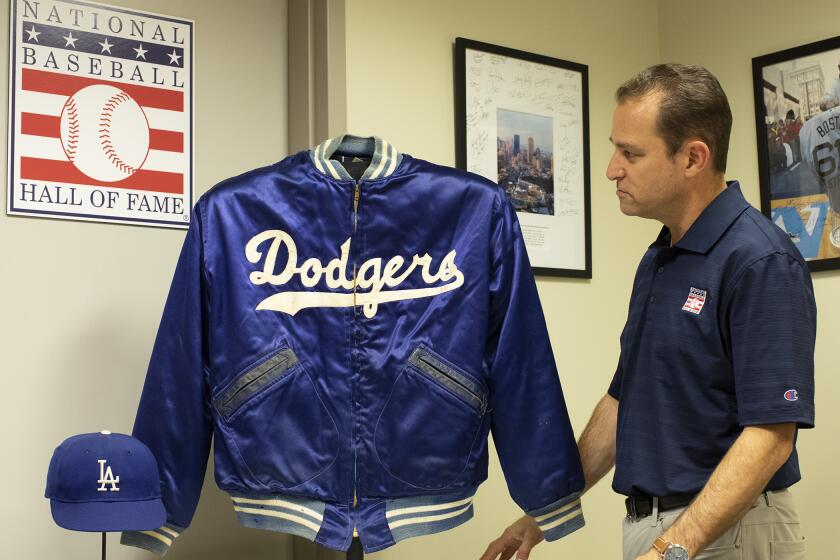Next Owner Should Hit Dodgers Out of the Park
- Share via
I have been told that Eli Broad, the Los Angeles civic leader, insurance magnate and developer, does not care for the shorthand term the news media often use to describe him: “billionaire philanthropist.” But he might like even less my term for him: “busybody philanthropist.”
That’s not always as negative as it sounds. Sometimes busybodies do good, as when Broad helped revive plans to build the Walt Disney Concert Hall. On the other hand, his efforts to reform L.A.’s public schools sometimes smack of elitism.
In recent days, Broad has been at his busybody best as he quietly tried to elbow his way into negotiations by the Fox Group to sell the Los Angeles Dodgers to Boston developer Frank McCourt. McCourt’s fortune came from parking lots in downtown Boston, so he’s apparently not rich enough for some key political players in Los Angeles. They worry that his offer of $430 million for the Dodgers is so dependent on business loans that it may leave the team in worse financial shape than Fox’s shortsighted ownership has. That is reportedly what prompted Broad to make his last-minute bid to buy the Dodgers -- also a $430-million offer, but mostly in cash.
But Broad’s offer may be too late to derail McCourt. Some baseball experts think it might even prompt owners of other major league teams to support McCourt, despite any doubts they have about his financial viability, just to remind Broad -- and the presumptuous L.A. pols who urged him to buy the Dodgers -- who runs baseball.
The official reason politicians gave for meddling in the Dodger deal -- in a City Council resolution introduced Tuesday -- is a desire to keep the team under local ownership. But an unstated reason is their nostalgia for a time when the Dodgers were an elite team and a unifying force in this sprawling, diverse city. Back then the Dodgers were run by the late Walter O’Malley, who moved the team from Brooklyn in 1958.
But nostalgia for the O’Malleys obscures some unpleasant realities about the Dodgers and their move to Los Angeles, not least among them the fact that many local folks never embraced the team. Many residents of Echo Park have never considered the Dodgers good neighbors, given how stadium traffic disrupts their lives at least 80 times a year. And other Angelenos never liked the one-sided land deal that helped bring the Dodgers west in the first place.
Retelling that tale begins with Palo Verde, La Loma and Bishop, the Mexican American barrios that once occupied the land where Dodger Stadium sits in Chavez Ravine. The old homes there were supposed to be replaced by public housing, with longtime residents getting first choice of the new units. But city leaders decided that was too “socialistic” for 1950s L.A., and the land remained unused until O’Malley expressed an interest in building a stadium there.
So city officials engineered a land swap -- a little more than 300 acres of Chavez Ravine in exchange for a minor league stadium O’Malley owned in South L.A. -- that was narrowly approved by city voters. And the “Battle of Palo Verde” ensued. That is what local Latino activists call the final expulsion, by county sheriff’s deputies, of the few homeowners who still lived in Chavez Ravine and refused to sell their properties.
It was quite a show, as captured in old newsreels and photos. The last holdouts were literally carried from their houses as bulldozers moved in. Most Angelenos today are unaware of the spectacle, but few Latinos who lived here then have forgotten it.
Which is why what intrigues me most about the impending sale of the Dodgers is what will happen to Chavez Ravine. This could be an opportunity to raze an aging stadium and put those 300-odd acres to better use.
The Broad camp insists he has no interest in building a new ballpark downtown, where fans could use mass transit as well as the freeways to get to games. McCourt has not indicated what his plans are for Chavez Ravine.
But Broad should reconsider. Both he and McCourt are developers, and they must be aware of how badly Los Angeles needs new affordable housing. L.A. also has fewer parks than any major U.S. city, so a side benefit of abandoning Dodger Stadium could be an expansion of Elysian Park, which borders on all those barren stadium parking lots.
It really shouldn’t matter who ends up owning the Dodgers -- Boston’s parking lot king or L.A.’s billionaire busybody. It’s more important that both men are developers who understand the value of real estate. They should use that expertise to rectify the error city fathers made when they were desperate for big league baseball.
More to Read
Are you a true-blue fan?
Get our Dodgers Dugout newsletter for insights, news and much more.
You may occasionally receive promotional content from the Los Angeles Times.










